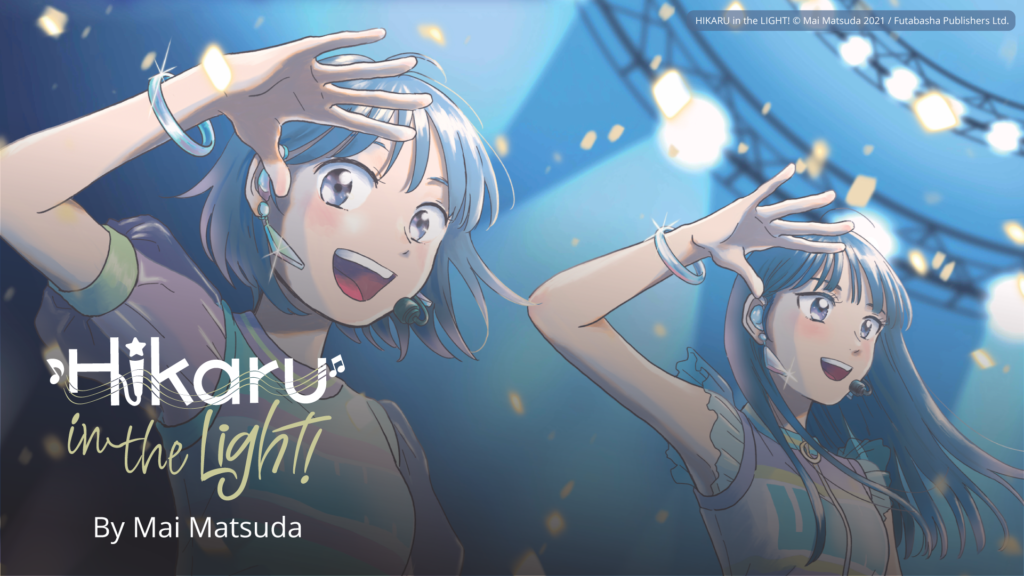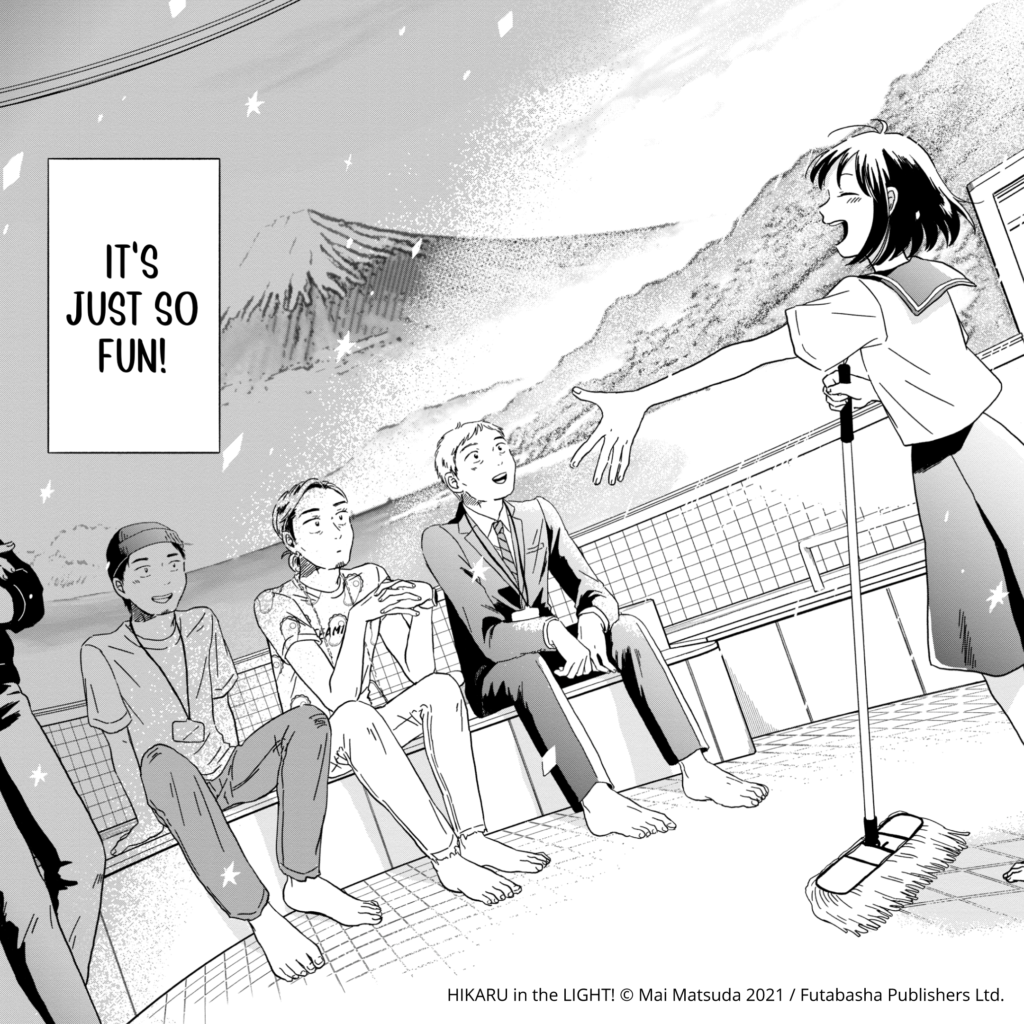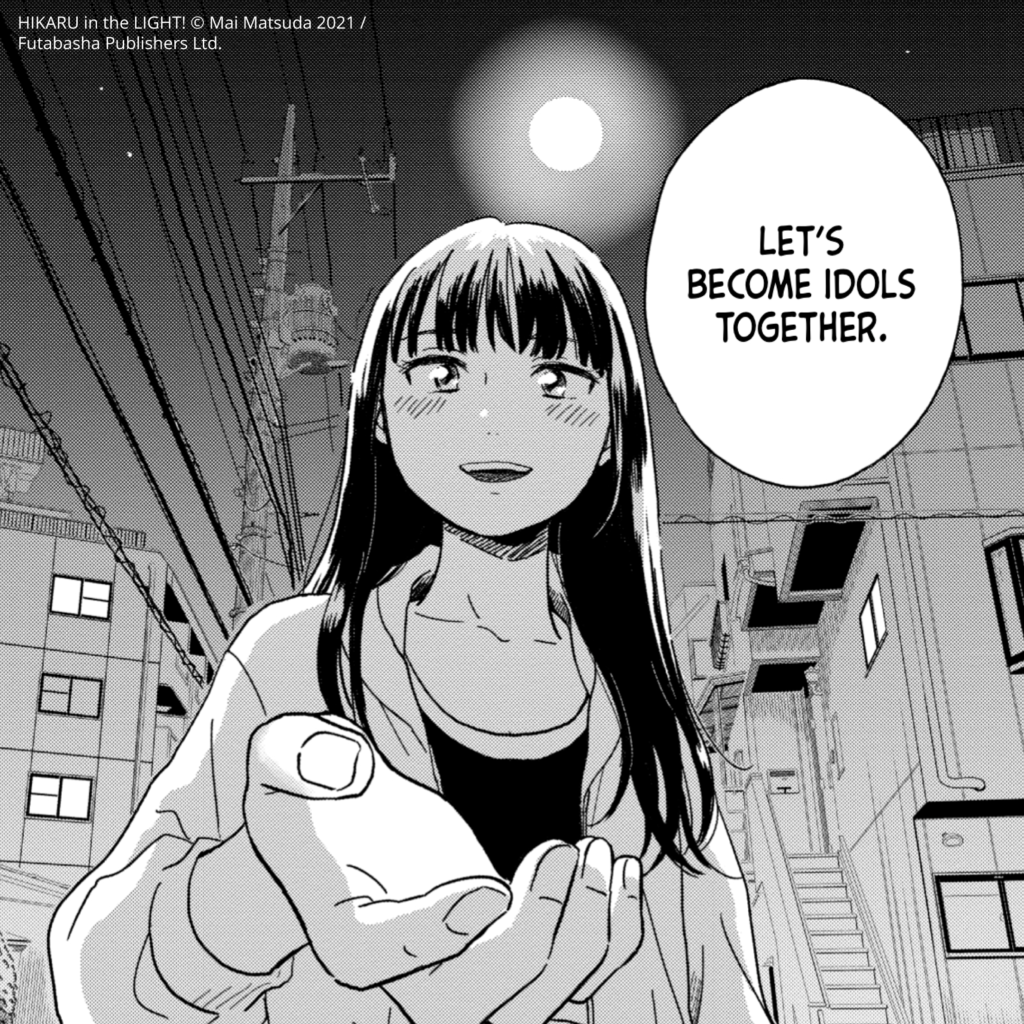Manga: Hikaru in the Light
June 19, 2022 · 0 comments
By Jonathan Clements.

Hikaru likes to sing while she is sweeping up at work. But she is good at it. Good enough to turn it in to a career? Nobody would take it that seriously, until her old friend Ran-chan returns from the Big City and announces that she is going to audition for a New Faces talent show. Ran-chan has semi-professional experience and years of dancing and singing training behind her, but recognises that Hikaru has something else – call it the ability to read a room, or to win over a crowd… she isn’t sure. But that, plus singing talent, plus years and years of hard work, might be enough to turn her into the next big idol. For however long that lasts…
Creator Mai Matsuda begins her manga Hikaru in the Light with a flash-forward that makes it clear where we are going – Mai will get on stage. She will sing in front of an audience. But even as the spotlight comes on, she is plagued by hectoring doubts, about all those young girls who are put in frilly dresses and punted out to wriggle in front of crowds, and then dropped when they are no longer of use.

In other words, Matsuda’s rags-to-riches tale is a quiet protest about, well, the whole idol singer industry. Everywhere in the modern world, but particularly in Japan, the politics of mass media entertainment favours the sort of algorithm-based dole that works enough to make money for corporations. Matsuda uses manga and talento, two of the most commodified and over-saturated media ever, to mount an argument for better things.
Her heroine, Hikaru, is already marked as a special case – the innocent teenager at the bath-house who sings golden oldies to please her grandfather. And when I say golden oldies, I mean that the first name to be dropped is Carole King. But the story is not merely about Hikaru, it’s about Ran-chan, the girl two years above her who is an aspiring singer. And it’s here that Matsuda wins over the cheap seats, because while she may roll her eyes at what passes for entertainment in the mass media, she also has the utmost respect for the artistes who perform it. With a tone that will be familiar to any fans of Love! Live, Matsuda understands that bopping around to bubble-gum pop, trilling ditties about young love, and winning over a crowd of indifferent and fickle passers-by is still no mean feat. It requires, in fact, superhuman levels of skill and determination – Ran-chan has been honing her abilities for years like some frilly martial artist, and is set with steely resolve on a career in the arts.
Matsuda even hammers her point home by swiftly dropping another three years back in time, to a pre-teen Hikaru, hearing about Ran-chan’s first auditions and training, and gushing in wonderment about how tough it’s going to be. But anyway, she digresses, as do I… because “M. Hayama” (nobody knows what the M stands for) is Japan’s Simon Cowell, a svengali sneering in his disregard for the idol industry, but taking its shilling anyway for Girls in the Light, a new reality show to create a new girl-group.

Hayama cuts to the chase of many a sports-manga or media-manga stereotype – the idea that actual talent has somehow become a dirty word. He doesn’t want girls who will just “work hard”, enough to be patronised by forgiving crowds if they miss a note or trip onstage. This is not, he argues, idol camp (except it’s totally idol camp). He wants girls who already have a special spark, but who are ready to refine it to a professional standard. I was expecting him to break into a well-known speech from another well-known story: “You’ve got big dreams, you want fame. Well, fame costs. And right here is where you start paying, in sweat.”
And Ran-chan wants in. To Hikaru’s great surprise, she quits her second-string background role in an over-populated chorus line and comes back to her home town, determined to audition for Girls in the Light under the touching faith that Hayama is genuine, that this will be real, and that it will give her a better chance at the career she wants. When Hikaru admonishes her that it’s not just a pretty face, it’s not just onstage talent, it’s the little things like being able to get a laugh with the right gag on a chat show, Ran-chan suggests they audition together.
Matsuda’s manga is slickly drawn and dynamically laid out. And it has something of an uphill struggle before it, thanks to the unfortunate similarity of its title to Keiko Tobe’s With the Light (Hikaru to tomo ni), an acclaimed serial about raising an autistic child. In fact, when this review copy turned up from Azuki, I immediately assumed that they had re-released With the Light under a different title, and consequently was not expecting a bunch of gyrating schoolgirls.

The step-by-step formulae are clear for all to see – and we’ve seen them all before, in everything from Mask of Glass to Top Gun (which is basically a ballerina melodrama, but with planes). Mai has to make it through the regionals, she has to survive in the Tokyo dorm environment, she has to beat her personal demons and overcome her weaknesses, while one-by-one her rivals and friends are sure to be cut from the herd. What happens, one wonders, if it comes down to just her and Ran-chan facing off, like Gladiator (which is a ballerina melodrama… but with swords)?
But Matsuda wins through with the real heart she puts into her girls’ struggle, and the unwavering respect she has for their will to succeed in their chosen field. The world of manga, like the world of idols, is full of idol stories. But Hikaru in the Light is an incisive glimpse of the pressures and concerns of a would-be performer, cloaking a long discussion of why it is that the media industry is ready and able to put children through such hothouse pressures in the name of light entertainment.
“If youth is made up of the things I can only do now,” Hikaru says, “then I want to make this my youth.”
Jonathan Clements is the author of Anime: A History.
Hikaru in the Light, by Mai Matsuda is being released online by the Azuki manga café.
Leave a Reply